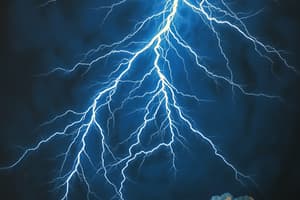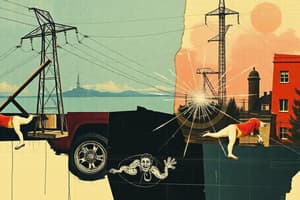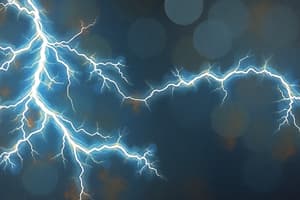Podcast
Questions and Answers
Light, heat, chemical and magnetic changes are all produced by:
Light, heat, chemical and magnetic changes are all produced by:
- A short circuit
- Electricity (correct)
- Force
- Conductors
Material that best transports electricity is a(n):
Material that best transports electricity is a(n):
- Watt
- Conductor (correct)
- Prism
- Insulator
Since silver and copper transmit electricity, they are called:
Since silver and copper transmit electricity, they are called:
- Closed circuits
- Conductors (correct)
- Insulators
- Electrons
Materials that do not allow a current to pass through them are called:
Materials that do not allow a current to pass through them are called:
Material such as glass, rubber or paper around a conductor that does not allow current to pass through it is called a(n):
Material such as glass, rubber or paper around a conductor that does not allow current to pass through it is called a(n):
Which of the following materials does not allow a current to pass through it?
Which of the following materials does not allow a current to pass through it?
An ampere is a unit of electric:
An ampere is a unit of electric:
How many milliamperes equal one ampere?
How many milliamperes equal one ampere?
A volt is a unit of electric:
A volt is a unit of electric:
A unit of electrical resistance is called a(n):
A unit of electrical resistance is called a(n):
A measure of how much electric energy is being used is known as a:
A measure of how much electric energy is being used is known as a:
A constant electric current flowing in one direction is called a(n):
A constant electric current flowing in one direction is called a(n):
Which of the following devices breaks the flow of current when an overload occurs?
Which of the following devices breaks the flow of current when an overload occurs?
Which of the following steps should not be followed to break the circuit when a person comes in contact with an electric current?
Which of the following steps should not be followed to break the circuit when a person comes in contact with an electric current?
The application of special currents (or modalities) that have a variety of effects on the skin is called:
The application of special currents (or modalities) that have a variety of effects on the skin is called:
When performing an Electrotherapy procedure, what apparatus or current conductor is used to bring the current from the appliance to the client's skin?
When performing an Electrotherapy procedure, what apparatus or current conductor is used to bring the current from the appliance to the client's skin?
The direct current used in Electrotherapy treatments is:
The direct current used in Electrotherapy treatments is:
The electrode that is negatively charged during an Electrotherapy treatment is known as a(n):
The electrode that is negatively charged during an Electrotherapy treatment is known as a(n):
What temporary effect will a negative electrode pole produce when applying galvanic current during an Electrotherapy treatment?
What temporary effect will a negative electrode pole produce when applying galvanic current during an Electrotherapy treatment?
Which of the following is not a temporary effect of the positive pole of galvanic current?
Which of the following is not a temporary effect of the positive pole of galvanic current?
Which Electrotherapy treatment can cause sebum to be broken down or blackheads to be liquefied, as in deep-pore cleaning?
Which Electrotherapy treatment can cause sebum to be broken down or blackheads to be liquefied, as in deep-pore cleaning?
When using galvanic current on clients in a salon, what precaution must a cosmetologist take in order to prevent injury to the client?
When using galvanic current on clients in a salon, what precaution must a cosmetologist take in order to prevent injury to the client?
Faradic current is used chiefly to cause:
Faradic current is used chiefly to cause:
Flashcards are hidden until you start studying
Study Notes
Fundamentals of Electricity
- Light, heat, chemical, and magnetic changes are all effects produced by electricity.
- Electricity is best transported through conductors, which are materials like silver and copper.
- Materials that prevent current flow are known as insulators (e.g., glass, rubber, paper).
- Alcohol is an example of a material that does not permit current to pass through.
Electric Current and Measurement
- An ampere measures electric strength; one ampere equals 1,000 milliamperes.
- A volt represents electric pressure, while ohm is the unit for electrical resistance.
- Watts measure the amount of electric energy being used.
Types of Electric Currents
- Direct current (DC) is a constant flow of electricity in one direction, used in many devices.
- Alternating current (AC) changes direction periodically, most commonly utilized in household power supply.
Circuit Safety Devices
- Circuit breakers and fuses are critical components that stop current flow when there’s an overload.
- Proper steps must be followed in emergencies, such as unplugging devices or using insulators, without touching a person in contact with live circuits.
Electrotherapy
- Electrotherapy applies specific electrical currents for various skin effects.
- Electrodes serve as conductors for delivering the treatment to the skin.
- Galvanic current is a direct current used in Electrotherapy, with the negatively charged electrode referred to as the cathode.
Effects of Electrotherapy
- The negative electrode in galvanic treatments can induce increased blood flow.
- Positive electrode effects may include soothing nerves and producing acidic reactions but not softening tissues.
- Desincrustation is an Electrotherapy method that breaks down sebum and cleanses pores.
Precautions in Electrotherapy
- Avoid using galvanic current over areas with broken capillaries to prevent injury.
- Faradic current is specifically used for inducing muscle contractions, making it significant in therapeutic applications.
Studying That Suits You
Use AI to generate personalized quizzes and flashcards to suit your learning preferences.




